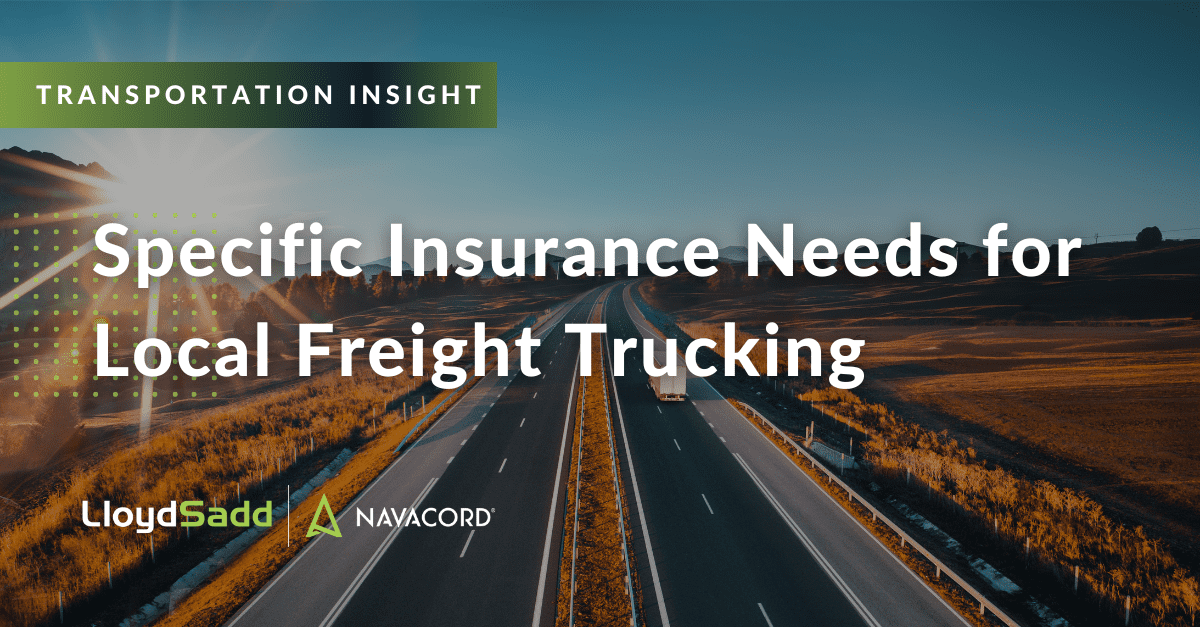Specific Insurance Needs for Local Freight Trucking

While over-the-road and regional vehicles traverse large areas and cross borders, local trucks remain within metropolitan areas. As a result of that tight-knit territory, local freight truckers must navigate smaller roads. They also face a wider array of potential accidents.
Hazards include congestion, one-way streets, pedestrians, cyclists and traffic mitigation measures like roundabouts and lights, as well as tight loading docks and loading/unloading processes that differ by customer and location.
Given these challenges, having the right local freight trucking insurance is imperative for your trucking company’s financial stability.
Some Insurance is Required
Most provinces require local freight trucking companies to carry some trucking insurance, usually commercial auto liability.
Commercial auto liability covers you if your drivers harm others or their property in the course of operating a company vehicle. Commercial auto liability does not cover damage to your company vehicles o rinjuries sustained by your employees. Those are covered by vehicle physical damage insurance and workers’ compensation, respectively. Workers’ comp is required in almost every province, depending on the size of your company and makeup of your drivers.
To protect your assets beyond what is minimally required, you may wish to carry several other important coverages.
Physical damage
Mentioned above, this coverage includes comprehensive and collision protection for your company’s vehicles. “Collision” covers damage to your truck if it hits something or overturns .“Comprehensive” covers nearly all other types of damage, including fires, theft and vandalism, unless they are specifically excluded.
General liability insurance
This type of policy covers you if you or one of your drivers damages someone’s property or causes them bodily injury during work hours while not operating a company truck. It helps pay for claims costs such as legal fees, settlements or judgments, medical expenses and professional help restoring your reputation.
Motor truck cargo
This type of insurance covers the value of the goods you are hauling and provides restitution if that cargo is damaged, stolen or lost. It also covers the cost of debris removal and freight charges if an accident leads to substitute transportation for your freight. Your premium will be based on the type of cargo you haul. Policies typically exclude contraband, drugs, tobacco, alcohol, live animals, and any property or goods you own. Your insurance broker can also outline scenarios where coverage won’t apply, such as when goods are intentionally damaged, they degrade due to poor packaging or shipping conditions, or the nature of the product leads to an expected loss of quality or volume.
Special Considerations
The insurance described above covers the basics, but local trucking varies by type, scope and vehicle usage. Some of the most common add-on policies are listed below, but your broker may recommend others depending on your operations.
Nontrucking liability (NTL)
If you are an owner-operator working independently or under a permanent contract with a motor carrier, you are covered under your own general liability policy or the motor carrier’s. However, your coverage only applies when you’re using the truck for business. If you drive your truck for personal use, you’ll need NTL for these instances.
Bobtail insurance
Although less common in local freight hauling bobtail insurance covers you when you are driving just the cab. Typically, only drivers under lease agreements need this coverage, as liability
policies for owner-operators usually include bobtail protection. However, policies differ by insurance company, so confirm with your broker.
Trailer interchange insurance
If you don’t own the trailers you’re using and are transporting someone else’s trailer from one location to another, you’ll need this insurance. It covers the cost of any physical damage caused to another owner’s trailer while in your possession.
Commercial fleet insurance
If you own and operate more than one truck, fleet insurance is usually amore cost-effective option than purchasing insurance for each vehicle individually.
Umbrella insurance
The expense of some lawsuits can go well beyond your primary liability limits. Umbrella insurance provides a cost-effective safety net to cover catastrophic losses. While it won’t pay for damages to your property, it will protect you if you’re accused of or found at fault for someone else’s injury, death or property damage. Umbrella coverage picks up where your primary liability policy ends.
Refrigeration breakdown
If your truck or fleet includes heated or refrigerated units, this policy covers the liability costs associated with cargo loss due to equipment failure.
Permanently attached equipment
Some property damage policies exclude specific types of permanently attached equipment like electronics, or custom accessories like murals, decals and running boards. If you’ve invested in such items, this add-on policy will reimburse you for their repair or replacement if they’re damaged by a covered peril.
Specialized hauling
Based on the types of vehicles you have and your hauling category, you may need specialized coverage. Examples include dedicated policies for logging trucks, tankers and refrigerated trucks and the hauling of hot or liquid asphalt, steel, sand and gravel.
Business owners insurance
If you are a trucker and a business owner with employees and a physical location, you’ll need additional insurance for full protection. Depending on your situation, this may include employment practices liability insurance and commercial property insurance. Employment practices liability covers your company for issues related to mistreatment of employees, and commercial property insurance covers your buildings and their contents. Keep in mind that your homeowners insurance won’t cover your business property if you have a home office, so commercial property insurance is essential.
Trucking insurance can be complicated. What and where you haul, and whether you are an independent owner-operator or a business owner makes trucking insurance complex. An insurance professional familiar with local trucking can review your operations, explain any exclusions and design a plan that’s right for you.
To download the insight, click here: Transportation_Insight_Specific Insurance Needs for Local Freight Trucking